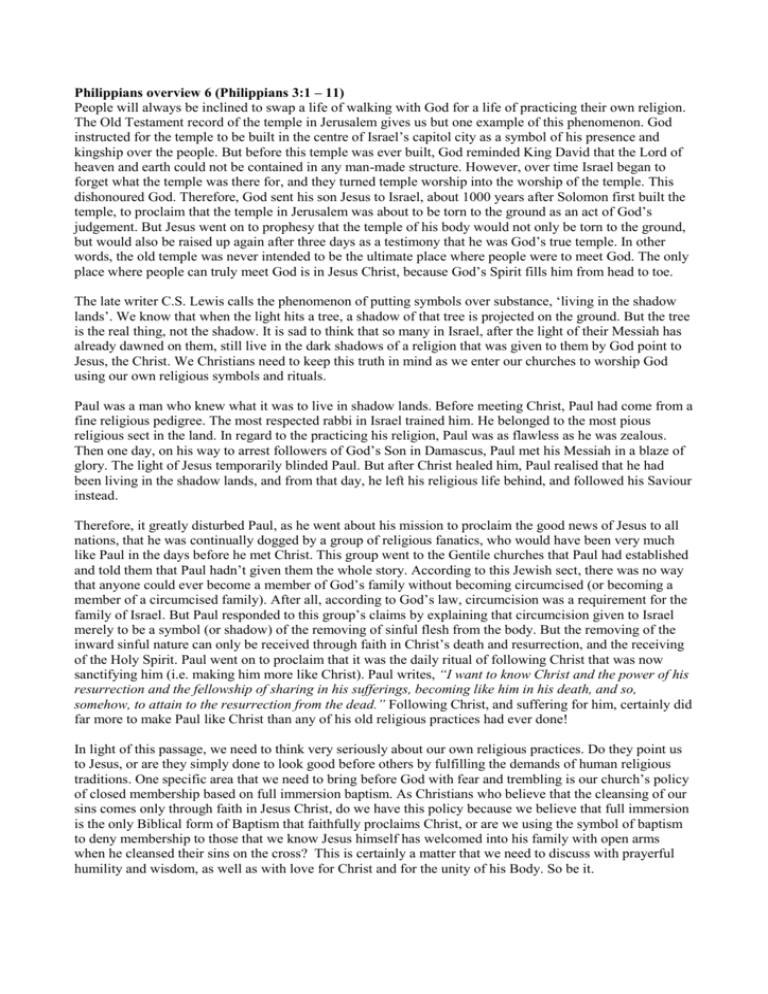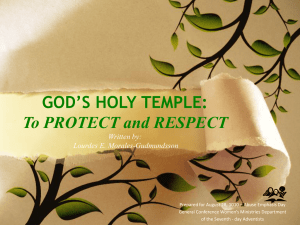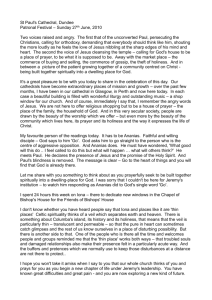View Attached File - Springwood Baptist Church
advertisement

Philippians overview 6 (Philippians 3:1 – 11) People will always be inclined to swap a life of walking with God for a life of practicing their own religion. The Old Testament record of the temple in Jerusalem gives us but one example of this phenomenon. God instructed for the temple to be built in the centre of Israel’s capitol city as a symbol of his presence and kingship over the people. But before this temple was ever built, God reminded King David that the Lord of heaven and earth could not be contained in any man-made structure. However, over time Israel began to forget what the temple was there for, and they turned temple worship into the worship of the temple. This dishonoured God. Therefore, God sent his son Jesus to Israel, about 1000 years after Solomon first built the temple, to proclaim that the temple in Jerusalem was about to be torn to the ground as an act of God’s judgement. But Jesus went on to prophesy that the temple of his body would not only be torn to the ground, but would also be raised up again after three days as a testimony that he was God’s true temple. In other words, the old temple was never intended to be the ultimate place where people were to meet God. The only place where people can truly meet God is in Jesus Christ, because God’s Spirit fills him from head to toe. The late writer C.S. Lewis calls the phenomenon of putting symbols over substance, ‘living in the shadow lands’. We know that when the light hits a tree, a shadow of that tree is projected on the ground. But the tree is the real thing, not the shadow. It is sad to think that so many in Israel, after the light of their Messiah has already dawned on them, still live in the dark shadows of a religion that was given to them by God point to Jesus, the Christ. We Christians need to keep this truth in mind as we enter our churches to worship God using our own religious symbols and rituals. Paul was a man who knew what it was to live in shadow lands. Before meeting Christ, Paul had come from a fine religious pedigree. The most respected rabbi in Israel trained him. He belonged to the most pious religious sect in the land. In regard to the practicing his religion, Paul was as flawless as he was zealous. Then one day, on his way to arrest followers of God’s Son in Damascus, Paul met his Messiah in a blaze of glory. The light of Jesus temporarily blinded Paul. But after Christ healed him, Paul realised that he had been living in the shadow lands, and from that day, he left his religious life behind, and followed his Saviour instead. Therefore, it greatly disturbed Paul, as he went about his mission to proclaim the good news of Jesus to all nations, that he was continually dogged by a group of religious fanatics, who would have been very much like Paul in the days before he met Christ. This group went to the Gentile churches that Paul had established and told them that Paul hadn’t given them the whole story. According to this Jewish sect, there was no way that anyone could ever become a member of God’s family without becoming circumcised (or becoming a member of a circumcised family). After all, according to God’s law, circumcision was a requirement for the family of Israel. But Paul responded to this group’s claims by explaining that circumcision given to Israel merely to be a symbol (or shadow) of the removing of sinful flesh from the body. But the removing of the inward sinful nature can only be received through faith in Christ’s death and resurrection, and the receiving of the Holy Spirit. Paul went on to proclaim that it was the daily ritual of following Christ that was now sanctifying him (i.e. making him more like Christ). Paul writes, “I want to know Christ and the power of his resurrection and the fellowship of sharing in his sufferings, becoming like him in his death, and so, somehow, to attain to the resurrection from the dead.” Following Christ, and suffering for him, certainly did far more to make Paul like Christ than any of his old religious practices had ever done! In light of this passage, we need to think very seriously about our own religious practices. Do they point us to Jesus, or are they simply done to look good before others by fulfilling the demands of human religious traditions. One specific area that we need to bring before God with fear and trembling is our church’s policy of closed membership based on full immersion baptism. As Christians who believe that the cleansing of our sins comes only through faith in Jesus Christ, do we have this policy because we believe that full immersion is the only Biblical form of Baptism that faithfully proclaims Christ, or are we using the symbol of baptism to deny membership to those that we know Jesus himself has welcomed into his family with open arms when he cleansed their sins on the cross? This is certainly a matter that we need to discuss with prayerful humility and wisdom, as well as with love for Christ and for the unity of his Body. So be it.








